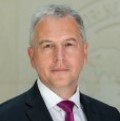Wednesday, Oct 11, 2023 | 12:00 PM - 12:30 PM
Location: AB02 Irhoud
REPORT
Blurb:
What is the path ahead for ECB monetary policy in the current context of elevated uncertainty and continuous structural changes. Discussion areas include the difficult tradeoffs that the ECB faces while maintaining a restrictive stance and key considerations to contain present and future inflationary pressures in the euro area.
Key Points:
Quotes:
“We also know that uncertainty remains very, very high and that we may have different shocks of different sizes or of differing origins. And that, of course, we will need to respond to those shocks accordingly.” Pablo Hernández de Cos
“I remember being in Washington in the Spring meetings, giving a speech in which, I was emphasizing how little we knew about the monetary policy transmission in the current context. I think we've gained a lot of experience during the last few months, and we are now confident at the European Central Bank that monetary policy is being forceful.” Pablo Hernández de Cos
Contributor: Paris Gkartzonikas
OVERVIEW
EUR Director Alfred Kammer and Bank of Spain Governor Pablo Hernandez de Cos will discuss the challenges facing the European Central Bank as it battles still-elevated inflation. The euro area economy showed remarkable resilience following Russia’s invasion of Ukraine and the resulting cost-of-living crisis in 2022. Activity has weakened over the course of 2023 while inflation still remains high. Over the past 15 months, the ECB has pursued the steepest hiking cycle in its history to bring price pressures under control in an environment of elevated uncertainty and ongoing structural shifts. The ECB continues to face difficult decisions on how much further and for how long it will need to maintain a restrictive stance. The conversation will examine the key considerations shaping the ECB’s approach to bring inflation back down to target in a timely manner.
SPEAKER

Pablo Hernández de Cos
Governor of the Bank of Spain
Pablo Hernández de Cos is Governor of the Banco de España and member of the Governing and General Council of the ECB. He is Chair of the BCBS, of the Board of Governors of the CEMLA and of the Advisory Technical Committee of the ESRB. He is member of various European and International Committees including the ESRB, the FSB, the BIS Group of Governors and Heads of Supervision and the Advisory Board of the FSI. He is also Vice-Chairman of the Board of the Spanish Macroprudential Authority Financial Stability Board (AMCESFI).
He holds a PhD in Economics (Complutense University, Madrid), a degree in Economics and Business Studies (CUNEF) and a degree in Law (UNED).
MODERATOR

Alfred Kammer
Director of the European Department, IMF
Alfred Kammer is the Director of the European Department at the International Monetary Fund since August 2020. In this capacity, he oversees the IMF’s work with Europe. Mr. Kammer was previously the Chief of Staff of the Office of the Managing Director, advising the Managing Director on strategic and operational issues and overseeing operations for the senior management team; Deputy Director of the Strategy, Policy and Review Department, overseeing the work on Fund strategy and surveillance policy; Deputy Director of the Middle East and Central Asia Department, overseeing regional economic developments and financial sector issues; Director of the Office of Technical Assistance Management, advising management on technical assistance operations and overseeing fundraising and global partnerships for capacity building; and Advisor to the Deputy Managing Director. Mr. Kammer also served as resident representative of the IMF in Russia. Since joining the IMF, Mr. Kammer worked with countries in Africa, Asia, Europe, and the Middle East, and on a wide range of policy and strategic issues.
PHOTOS